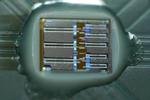Other

“Startup’s optoelectronic chips could reduce energy usage by up to 50 percent in data centers while increasing computing speeds. With novel optoelectronic chips and a new partnership with a top silicon-chip manufacturer, MIT spinout Ayar Labs aims to increase …

“Pocket-sized device detects charged particles in surrounding air. At any given moment, the Earth’s atmosphere is showered with high-energy cosmic rays that have been blasted from supernovae and other astrophysical phenomena far beyond the Solar System. When cosmic rays …

“A team of computer scientists and engineers from Sandia National Laboratories and Boston University recently received a prestigious award at the International Supercomputing conference for their paper on automatically diagnosing problems in supercomputers. The research, which is in the early …

“A group of researchers from the UK and the US have used machine learning techniques to successfully predict earthquakes. Although their work was performed in a laboratory setting, the experiment closely mimics real-life conditions, and the results could be used …

“New method combines precision printing of stretchable conductive inks with pick-and-place of electronic components to make flexible, wearable sensors Human skin must flex and stretch to accommodate the body’s every move. Anything worn tight on the body must also …

“A well-known computational problem seeks to find the most efficient route for a traveling salesman to visit clients in a number of cities. Seemingly simple, it’s actually surprisingly complex and much studied, with implications in fields as wide-ranging as …

“For robots to do what we want, they need to understand us. Too often, this means having to meet them halfway: teaching them the intricacies of human language, for example, or giving them explicit commands for very specific tasks. But …
